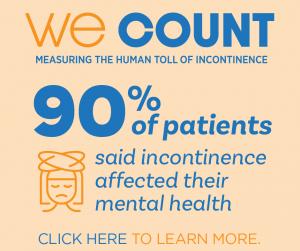National Association for Continence Releases 6th Annual Survey: Mental Health Greatly Impacted By Incontinence
NAFC’s new survey shows over 90% with incontinence report mental health impacts. Shame, fear, and disrupted daily life highlight the need for better support.
NAFC conducted a 56-question online survey with 330 adults currently experiencing incontinence to better understand not only the physical challenges, but also the psychological effects of bladder control issues.
Mental health impact is nearly universal. More than 90% of respondents say incontinence has negatively affected their mental health — and over half describe this effect as moderate or significant.
The findings demonstrate that urinary incontinence is far more than a hygiene condition or inconvenience — it has deep emotional consequences:
● Shame, anxiety, embarrassment, and loss of confidence were among the most common emotional effects reported.
● One-third of respondents said they do not feel emotionally supported by their partner or family.
Daily life is dictated by fear and constant planning. The condition severely disrupts everyday life:
● Travel (92%)
● Social activities (89%)
● Confidence (88%)
● Sleep (81%)
Most sufferers build their day around preventing accidents, 88% plan ahead for leakage and 50% always bring absorbent products.
Shame stops people from getting help. The vast majority( 69%) of sufferers hide their condition. Many rely on avoidance behaviors and planning ahead to cope. While 85% have talked to a healthcare provider, 15% have not and the #1 reason is embarrassment (47%). As a result, many people with incontinence suffer in silence, delaying treatment or avoiding speaking with healthcare providers due to embarrassment.
Treatment Often Falls Short: Emotionally and Physically
While 85% of participants have spoken to a healthcare provider and 80% received a diagnosis, long-term management remains inadequate:
● Absorbent products provide the most reliable relief, but do not improve quality of life
● Many treatments are not effective enough or lose adherence over time
● Due to frustration with ineffective treatments, 74% of respondents are interested in learning about other treatment options
These gaps contribute to ongoing anxiety, isolation, and fear of public accidents all of which prevent people from living life freely.
NAFC Executive Director Sarah Jenkins emphasized the need for change. “This data confirms what patients have been telling us for years, that incontinence affects both body and mind. People are struggling daily with fear, shame, and isolation. Our responsibility is to ensure that emotional and mental health support becomes a standard part of incontinence care, not an afterthought.” — Sarah Jenkins, Executive Director, National Association for Continence
Medtronic is a proud partner of this research. “It’s a privilege to sponsor this research, which underscores the importance of treatment options for bladder control symptoms,” said Emily Elswick, president of the Medtronic Pelvic Health business. “People deserve to fully participate in life, without the overwhelming impact this condition can have on their physical and emotional well-being.”
In honor of Bladder Health Awareness Month this November in partnership with Medtronic and Tenderheart, and as a core part of NAFC’s national “We Count” campaign which aims to break stigma, increase awareness, and provide support for seeking solutions NAFC will be continuing to release more data from this survey through the end of the year including social media, factsheets, podcasts and videos.
About NAFC
The National Association for Continence is the nation’s leading advocate for people living with bladder and bowel health conditions. Through education, support, and awareness initiatives, NAFC works to destigmatize incontinence and ensure that everyone has access to compassionate, effective care. http://nafc.org/we-count
Sarah Jenkins
National Association For Continence
+1 312-399-1353
email us here
Legal Disclaimer:
EIN Presswire provides this news content "as is" without warranty of any kind. We do not accept any responsibility or liability for the accuracy, content, images, videos, licenses, completeness, legality, or reliability of the information contained in this article. If you have any complaints or copyright issues related to this article, kindly contact the author above.

